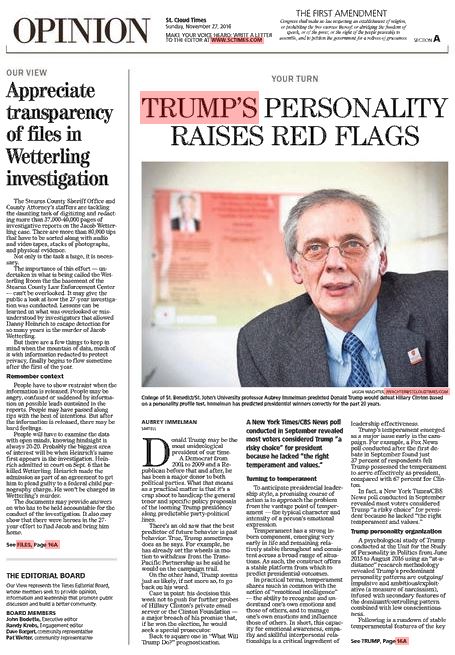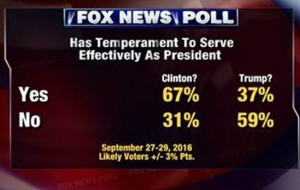Featured Posts

- Index of Psychological Studies of Presidents and Other Leaders Conducted at the Unit for the Study of Personality in Politics
- The Personality Profile of U.S. Supreme Court Associate Justice Brett Kavanaugh
- The Leadership Style of North Korean Leader Kim Jong-un
- North Korea Threat Assessment: The Psychological Profile of Kim Jong-un
- Russia Threat Assessment: Psychological Profile of Vladimir Putin
- The Personality Profile of 2016 Republican Presidential Candidate Donald Trump
- Donald Trump's Narcissism Is Not the Main Issue
- New Website on the Psychology of Politics
- Unit for the Study of Personality in Politics --- 'Media Tipsheet'
categories

- Afghanistan (228)
- Al Gore (2)
- Amy Klobuchar (4)
- Ayman al-Zawahiri (7)
- Barack Obama (60)
- Ben Carson (2)
- Bernie Sanders (7)
- Beto O'Rourke (3)
- Bill Clinton (4)
- Bob Dole (2)
- Campaign log (109)
- Chris Christie (2)
- Chuck Hagel (7)
- Criminal profiles (8)
- Dick Cheney (11)
- Domestic resistance movements (21)
- Donald Trump (31)
- Economy (33)
- Elizabeth Warren (4)
- Environment (24)
- George H. W. Bush (1)
- George W. Bush (21)
- Hillary Clinton (9)
- Immigration (39)
- Iran (43)
- Iraq (258)
- Jeb Bush (3)
- Joe Biden (13)
- John Edwards (2)
- John Kasich (2)
- John Kerry (1)
- John McCain (7)
- Kamala Harris (5)
- Kim Jong-il (3)
- Kim Jong-un (11)
- Law enforcement (25)
- Libya (18)
- Mahmoud Ahmadinejad (6)
- Marco Rubio (2)
- Michael Bloomberg (1)
- Michele Bachmann (173)
- Mike Pence (3)
- Military casualties (234)
- Missing person cases (37)
- Mitt Romney (13)
- Muqtada al-Sadr (10)
- Muslim Brotherhood (6)
- National security (16)
- Nelson Mandela (4)
- News (5)
- North Korea (36)
- Osama bin Laden (19)
- Pakistan (49)
- Personal log (25)
- Pete Buttigieg (4)
- Presidential candidates (19)
- Religious persecution (11)
- Rick Perry (3)
- Rick Santorum (2)
- Robert Mugabe (2)
- Rudy Giuliani (4)
- Russia (7)
- Sarah Palin (7)
- Scott Walker (2)
- Somalia (20)
- Supreme Court (4)
- Syria (5)
- Ted Cruz (4)
- Terrorism (65)
- Tim Pawlenty (8)
- Tom Horner (14)
- Tributes (40)
- Uncategorized (50)
- Vladimir Putin (4)
- Xi Jinping (2)
- Yemen (24)
Links

archives

- November 2021
- January 2021
- November 2020
- October 2020
- September 2020
- August 2020
- July 2020
- April 2020
- March 2020
- February 2020
- January 2020
- December 2019
- October 2019
- July 2019
- May 2019
- April 2019
- March 2019
- February 2019
- January 2019
- December 2018
- September 2018
- August 2018
- July 2018
- June 2018
- April 2018
- March 2018
- February 2018
- January 2018
- August 2017
- July 2017
- June 2017
- May 2017
- April 2017
- February 2017
- January 2017
- December 2016
- November 2016
- October 2016
- September 2016
- August 2016
- July 2016
- June 2016
- May 2016
- April 2016
- March 2016
- February 2016
- January 2016
- December 2015
- November 2015
- October 2015
- September 2015
- August 2015
- July 2015
- June 2015
- May 2015
- April 2015
- March 2015
- February 2015
- January 2015
- December 2014
- November 2014
- October 2014
- September 2014
- August 2014
- July 2014
- June 2014
- May 2014
- April 2014
- March 2014
- February 2014
- January 2014
- December 2013
- November 2013
- October 2013
- September 2013
- August 2013
- July 2013
- June 2013
- May 2013
- April 2013
- March 2013
- February 2013
- January 2013
- December 2012
- November 2012
- October 2012
- September 2012
- August 2012
- July 2012
- June 2012
- May 2012
- April 2012
- March 2012
- February 2012
- January 2012
- December 2011
- November 2011
- October 2011
- September 2011
- August 2011
- July 2011
- June 2011
- May 2011
- April 2011
- March 2011
- February 2011
- January 2011
- December 2010
- November 2010
- October 2010
- September 2010
- August 2010
- July 2010
- June 2010
- May 2010
- April 2010
- March 2010
- February 2010
- January 2010
- December 2009
- November 2009
- October 2009
- September 2009
- August 2009
- July 2009
- June 2009
- May 2009
- April 2009
- March 2009
- February 2009
- January 2009
- December 2008
- November 2008
- October 2008
- September 2008
- August 2008
- July 2008
meta

Trump’s Personality Raises Red Flags

College of St. Benedict/St. John’s University professor Aubrey Immelman, who predicted Donald Trump would win over Hillary Clinton based on their personality profiles, shown Wednesday, Nov. 16, 2016. Immelman has predicted presidential winners correctly for the past 20 years. (Photo: Jason Wachter / St. Cloud Times)
By Aubrey Immelman
St. Cloud Times
November 26, 2016
Donald Trump may be the most unideological president of our time. A Democrat from 2001 to 2009 and a Republican before that and after, he has been a major donor to both political parties. What that means as a practical matter is that it’s a crapshoot to handicap the general tenor and specific policy proposals of the looming Trump presidency along predictable party-political lines.
There’s an old saw that the best predictor of future behavior is past behavior. True, Trump sometimes does as he says – for example, he has already set the wheels in motion to withdraw from the Trans-Pacific Partnership as he said he would on the campaign trail.
On the other hand, Trump seems just as likely, if not more so, to reverse course and go back on his word.
Case in point: his decision this week not to push for further probes of Hillary Clinton’s private email server or the Clinton Foundation – a major breach of his campaign promise that, if he won the election, he would seek a special prosecutor to pursue the matter.
Back to square one in “What Will Trump Do?†prognostication.
Turning to temperament
To anticipate presidential leadership style, a promising course of action is to approach the problem from the vantage point of temperament – the typical character and intensity of a person’s emotional expression.
Temperament has a strong inborn component, emerging very early in life and remaining relatively stable throughout the life course and consistent across a broad range of situations. As such, the construct offers a stable platform from which to predict presidential outcomes.
In practical terms, temperament shares much in common with the notion of “emotional intelligence†– the ability to recognize and understand one’s own emotions and those of others, and to manage one’s own emotions and influence those of others. In short, this capacity for emotional awareness, empathy, and skillful interpersonal relationships is a critical ingredient of leadership effectiveness.
In practical terms, temperament shares much in common with the notion of “emotional intelligence†– the ability to recognize and understand one’s own emotions and those of others, and to manage one’s own emotions and influence those of others. In short, this capacity for emotional awareness, empathy, and skillful interpersonal relationships is a critical ingredient of leadership effectiveness.
Trump’s temperament emerged as a major issue in the 2016 presidential campaign. A Fox News poll conducted after the first presidential debate in September found that just 37 percent of respondents felt Trump possessed the temperament to serve effectively as president, compared with 67 percent for Clinton.
And a New York Times/CBS News poll, also conducted in September, revealed that most voters considered Trump “a risky choice†for president because he lacked “the right temperament and values.â€
Trump personality organization
A psychological study of Trump conducted at the Unit for the Study of Personality in Politics from June 2015 to August 2016 using an “at-a-distance†research methodology revealed that Trump’s predominant personality patterns are outgoing/impulsive and ambitious/exploitative (a measure of narcissism), infused with secondary features of the dominant/controlling pattern combined with low conscientiousness.
Following is a rundown of stable temperamental features of the key personality patterns driving Trump’s political behavior, based on the model of distinguished psychologist Theodore Millon:
- Outgoing (histrionic) pattern: Poor impulse control. Outgoing individuals are emotionally expressive; they are animated, uninhibited, and emotionally responsive. Their moods are subject to rapid fluctuation, with occasional displays of short‑lived and superficial moods. Regarding political leadership, the attendant risk is a predisposition to impulsive acts; they may be over-excitable, exhibit a pervasive tendency to be easily enthused and as easily bored or angered, make thoughtless, imprudent judgments, and embark on rash or reckless courses of action.
- Ambitious (narcissistic) pattern: Knee-jerk response to criticism. Narcissistic individuals are socially poised; at their best they are self-confident, optimistic, and cool and levelheaded under pressure and in the face of adversity. Though appearing carefree, nonchalant, and suave, their Achilles’ heel is responding reflexively and petulantly to personal criticism.
- Dominant (aggressive) pattern: A volatile temper. Dominant individuals present themselves as strong leaders but tend to lack empathy and are prone to irritability; they have a volatile temper they may at times find difficult to control, flaring readily into petty or contentious argument.

College of St. Benedict/St. John’s University professor Aubrey Immelman describes his personality profile of Donald Trump Wednesday, Nov. 16, at CSB. (Photo: Jason Wachter / St. Cloud Times)
Presidential red flags
Regarding the relationship between temperament and presidential leadership, the two personality traits of greatest concern in the case of Trump are these: first, the perilous combination of sparse political experience and a level of impulsiveness sufficiently unrestrained to have nearly torpedoed his presidential campaign on more than one occasion; and second, responding reflexively to personal slights with a combative temper.
As for Trump’s fitness to lead, the silver lining is that he has shown a willingness to surround himself with levelheaded, competent advisers capable of smoothing the rougher edges of his prickly personality – foremost among them campaign manager Kellyanne Conway and White House Chief of Staff designate Reince Priebus.
Imminently, the next big test for Trump will be whether he can resist the impulse to appoint top campaign surrogate and loyalist Rudy Giuliani – hamstrung by many of the same character flaws as Trump – to the key cabinet post of secretary of state, fourth in the presidential line of succession.
Trump would be well advised to give the nod to his harshest critic in the Republican establishment, Mitt Romney. The very temperamental blandness that made Romney a weak presidential candidate makes him an exceptional choice for the top cabinet post in the Trump administration.
That would be a true test of presidential character.
This is the opinion of Aubrey Immelman, associate professor of psychology at the College of St. Benedict and St. John’s University, where he directs a faculty-student collaborative research program in political psychology, the Unit for the Study of Personality in Politics. Immelman specializes in the psychological assessment of presidential candidates and world leaders.
Related reports on this site
Is Donald Trump a Malignant Narcissist? (Feb. 22, 2017)
Donald Trump’s Temperament: Trump’s Fitness to be President (Oct. 5, 2016)
The Personality Profile of 2016 Republican Presidential Candidate Donald Trump (Aug. 9, 2015)
January 5, 2018 update

The Case for Donald Trump’s Mental Fitness

Analysis by Chris Cillizza, CNN Editor-at-large
![]()
January 4, 2018
Excerpts
In the wake of three days of erratic behavior and amid the controversy caused by a book suggesting he is forgetful and dismissed by many who work for him, questions of President Donald Trump’s mental competence are everywhere. …
Trump is who he has always been.
Think about the sorts of behaviors that Trump’s critics point to as examples of his lack of mental competence or deteriorating mental state:
- He is impetuous
- He is quick to anger
- He appears unengaged in details
- He keeps erratic hours
- He says things that are probably false
- He has an exaggerated — and grandiose — vision of his own life
- He punishes enemies
There are others, of course. But these, I think, broadly cover the competence critique made against Trump.
Now, go back over that list. And ask yourself whether any of those behaviors are new since Trump has been elected president.
While you’re doing that, let me remind you that Trump did the following things as either a candidate or private citizen:
- Impersonated a young publicist within the Trump Organization to leak flattering details about his own personal life to the New York tabloids.
- Spent several years pursuing the totally debunked idea that President Barack Obama wasn’t born in the United States
- Made a series of lewd comments about women caught on tape by “Access Hollywood” (and then argued the tape might be a fake)
- Insisted that 3-5 million votes were cast illegally in the 2016 election
- Suggested Ted Cruz’s father might have been involved in the assassination of John Kennedy
Those are the ones I came up with off the top of my head. There are scores of others examples just like them. …
Trump is today who he has been the entirety of his adult life. …
The Trump on the campaign trail — full of bravado, fiercely unapologetic, dramatic, obsessed with victimization — was the Trump of the wheeling-and-dealing 1980s. It was the Trump of the reality TV show years. And it is the Trump of the White House.
The obvious pushback to this argument is that simply because Trump’s behavior isn’t inconsistent with who he has been his entire life doesn’t mean that he is mentally well enough to hold the office of the presidency.
Fair enough. I am not a psychologist or a psychiatrist, so diagnosing what, if anything, has long been wrong with Trump mentally (and if that impedes his ability to do the job) is well beyond my skill set.
But what seems clear — at least to me — is that the case for some sort of mental deterioration from Trump since he has been in office simply isn’t there. …
Read the full story at CNN.com
More » The Political Personality of 2016 Republican Presidential Nominee Donald J. Trump. Working paper, Unit for the Study of Personality in Politics, St. John’s University/College of St. Benedict, October 2016. Abstract and link for full-text (31 pages; PDF) download at Digital Commons: http://digitalcommons.csbsju.edu/psychology_pubs/103/
For additional information, please consult the Unit for the Study of Personality in Politics Media Tipsheet at http://personality-politics.org/2016-election-media-tipsheet/
Leave a Reply
You must be logged in to post a comment.




January 23rd, 2017 at 8:39 am
[…] A Question of Temperament: Donald Trump’s Fitness to Lead (Dec. 4, 2016) […]
June 8th, 2017 at 10:59 pm
“Political Death by 1,000 Tweets” (Karl Rove, Wall Street Journal, June 7, 2017) » https://www.wsj.com/articles/political-death-by-1-000-tweets-1496875182
As reported in The Hill (June 8, 2017), “Karl Rove, a former senior adviser to President George W. Bush, slammed President Trump on Wednesday, saying that the real estate mogul ‘lacks the focus or self-discipline to do the basic work required of a president.’ ‘His chronic impulsiveness is apparently unstoppable and clearly self-defeating’ …” » http://thehill.com/blogs/blog-briefing-room/news/337077-karl-rove-trump-lacks-the-focus-or-self-discipline-to-do-the
July 21st, 2017 at 9:17 am
“Democrats File 88-Point Resolution Outlining Why Trump Is Unfit for Office” (Nicole Lafond, TPM, July 20, 2017) — Citing issues ranging from inaccurate reports about crowd sizes at inauguration to the gender pay gap at the White House to the way the President has handled the investigation into Russian interference in the election, Democratic lawmakers have filed a “no-confidence†resolution against President Donald Trump that lists 88 reasons why he’s unfit to serve as President. … » http://talkingpointsmemo.com/livewire/democrats-file-88-point-resolution-outlining-why-trump-unfit-for-office
Full text of resolution: https://www.congress.gov/bill/115th-congress/house-resolution/456/text/ih?overview=closed&format=txt
Reference
Civic Impulse. (2017, July 21). H.Res. 456 — 115th Congress: Objecting to the conduct of the President of the United States. Retrieved from https://www.govtrack.us/congress/bills/115/hres456
July 26th, 2017 at 8:05 am
“ ‘Goldwater Rule’ still in place barring many psychiatrists from commenting on Trump†(Amy Held, NPR, July 25, 2017) » http://www.npr.org/sections/thetwo-way/2017/07/25/539238529/goldwater-rule-still-in-place-barring-many-psychiatrists-from-commenting-on-trum
The rule re-emerged in headlines … in the form of an article on the health news website Stat News » https://www.statnews.com/2017/07/25/psychiatry-goldwater-rule-trump/
January 9th, 2018 at 2:18 am
[…] Outgoing (histrionic) mood/temperament: poor impulse control — Animated, uninhibited, and emotionally responsive; moods subject to rapid fluctuation; may be over-excitable, exhibit a pervasive tendency to be easily enthused and as easily bored or angered, make thoughtless, imprudent judgments, and embark on rash or reckless courses of action. […]